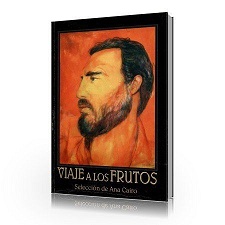" Journey to the fruits can be seen as a collage and can be heard as a chorus." This is how the essayist, researcher and professor Ana Cairo Ballester defines this repertoire [i] hers with which we celebrate, from the digital pages of Cubaliteraria, the 63rd anniversary of the triumph of the Cuban Revolution.
Published in August 2006 by the National Library of Cuba, this compilation seeks to build a polyphonic image of Fidel through the voices of four generations active after 1959 - that of the avant-garde, that of the Centennial, that of those who become intellectuals. between the sixties and eighties, and that of those who break into the so-called "special period" - who express, from literature and art, the links of the leader of the revolution with the Cuban intellectual community.
The predominant motifs of the book, according to the compiler, can be grouped as follows:
The epic dimension of the hero (prime especially in the poems); the mastery of the speaker and the values of History will absolve me ; the humanist ideology and ethics; the methods in the politico-social praxis; the excellence of the communicator, the traits of the charismatic leader; the member of the intellectual community, who needs to know the aspirations and projects of their colleagues (this premise is reiterated in private and public letters), among others.
The introductory text of the book, authored by Ana Cairo herself, is a brief but masterful essay in which she inserts Fidel into the generations of political-intellectuals who, from Martí to Mella, Villena, Roa and Che, have marked the history of our nation.
From there, the voices of Jorge Mañach, Alberto Bayo, Che Guevara, Carilda Oliver Labra, Pura del Prado, Indio Naborí, Emma Pérez, Marcelo Pogolotti, Waldo Medina, José Lezama Lima, Nicolás Guillén, César García Pons, Virgilio Piñera, Alejo Carpentier, Loló de la Torriente, Alfredo Guevara, Emilio Roig de Leuchsenring, Justo Rodríguez Santos, Ángel Augier, Mirta Aguirre, Cintio Vitier, Antonio Núñez Jimñenez, Gabriel García Márquez, Virgilio López Lemus, Roberto Fernández Retamar, Eusebio Leal , Nancy Morejón, Miguel Barnet, Ernesto Vera, Osvaldo Martínez and Axel Li, whose text, «Visual testimonies of a leader», introduces an image gallery where caricature, poster, photography and painting coexist.
The diversity of points of view, genres and author voices, makes it worth mentioning each of the texts included; However, as an invitation to the reader to delve into this corpus, we will only briefly quote the vision about Fidel written by Marcelo Pogolotti for the newspaper El Mundo in early February 1959: «Fidel Castro illuminated the vast extension of these implications and knew how to get the most out of them revolutionary, boosting with a cyclonic blow. At the same time he was doing a true work of creation; He imposed a tone, a philosophy and a style that has penetrated all layers of the population. Faced with the great copy of difficult contingencies that will come to meet him, his stature as a protagonist will continue to grow ».
It is precisely this symbiosis of the hero, the people, and the revolutionary process that allows us to celebrate the anniversary of the triumph today with an evocation of Fidel, leader and creator of a work of profound humanistic meaning.
[i] We transcribe the precision of the compiler on the use of this term: The word repertoire is used in the third meaning of the dictionary: «set of works». There is not yet a collection large enough for the qualitative ranking inherent in an anthology. This is a first version and the word repertoire is more in line with the characteristics of the selection that can now be offered.


Deje un comentario